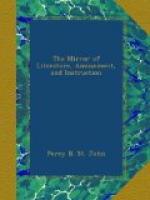[This is a maxim of Confucius, who assigns this reason. “For if you treat them with gentleness and familiarity, they lose all respect; if with rigour you will have continual disturbance.”]
“If the river is deep, which you are to pass on foot, go through it clothed in the ancient manner; if shallow, tuck up your garments.”
[The Chinese believe that at first men went naked, or at most loosely clad in the skin of some animal. Vide Mart. Hist. p. 18. This proverb is applied to inculcate the necessity of accommodating one’s self to the different circumstances of life.]
“Know when to stop seasonably.”
“Learn to be content with what suffices.”
["What need have we of riches? (saith a Chinese moralist.) Produce me the man, who, content with a straw cottage, and a little enclosure of canes, employs himself in reading the writings of our wise men, or in discoursing on virtue; who desires no other recreation than to refresh himself with the cool air by moonshine, and whose whole solicitude is to preserve in his heart the love of innocence and of his neighbour.” P. Du Halde, 2. 103.]
Similar to this proverb are the Latin, “Quod satis est cui continget nihil amplius optet.”
The French, “Qui a assez, n’a plus rien a desirer.”
And the English “Enough is as good as a feast.”
“Let us love others, as we love ourselves.”—Confucius.
G.L.S.
* * * * *
ANCIENT TOM AND JERRY.
The Emperor Nero would frequently ramble in the streets of Rome, diguised by night, with a band of disorderly companions, abusing all that fell in their way. In the beginning of Nero’s reign, Otho, who was then distinguished as a young man of graceful person but licentious manners, was one of Nero’s favourites and accompanied him from his palace, to visit the meanest taverns and scenes of debauchery which Rome contained.
Suetonius tells us—“The Emperor Otho, would stroll out in dark nights, and where he met a helpless, or drunken man, he gave him the discipline of the Blanket, which was a kind of punishment called sagatio; alias ’Tossing in a Blanket:”
“All, oh! he cried—what
street, what lane, but knows
Our purgings, pumpings, blanketings,
and blows?”
POPE.
In truth, Nero and Otho were the Tom and Jerry (or something worse) of ancient days, and if now in existence they would be tossed into a jail or tread-mill, or else find special good bail.[26]
P.T.W.
[26] Sir Richard Birnie would never
suffer imperial larking
to go unpunished.
* * * * *
An Irish footman, who got a situation at the west end of London, on entering a room where there was a vase with golden fish, exclaimed, “Well, by J——, this is the first time I ever saw red herrings alive.”




